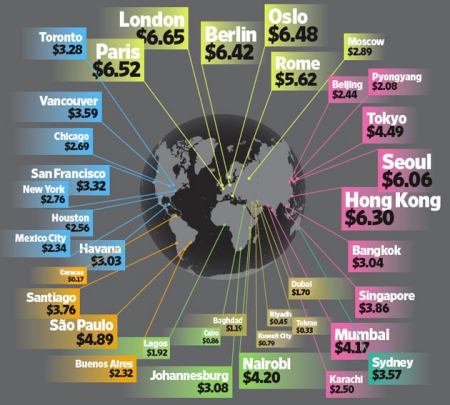Peak oil, tech boom share some parallels
The most surprising tidbit in Matthew Simmons' peak oil book, Twilight in the Desert, is about a dubious oil consultancy based in Austria.
If memory serves, the firm earned its keep counting oil tankers leaving major ports.

The data were keenly awaited by the marketplace and could move the price of crude sharply and quickly. Investors, users and producers paid handsomely for the information.
What the book revealed was that this towering fountain of information was housed in a small, dumpy office above a corner store in land-locked Vienna and the data weren't, in retrospect, particularly reliable. For all we know, it might have cobbled together its theories by dumpster diving behind the nearby headquarters of the Organization of Petroleum Exporting Countries.
Oil is the lifeblood of the world's economy and yet the oil markets are clouded in dubious information. Take Mr. Simmons' thesis, that Saudi Arabian production was on the verge of declining. The kingdom angrily denied this. The fact that there could even be an argument was only possible because of the secrecy with which it and other OPEC producers guard their data.
Mr. Simmons reached his conclusion by poring over hundreds of technical articles published in academic and industry journals, and sketching what he considered a more realistic picture.
Oil companies disputed the idea. Over the past couple of years, Exxon executives have shaken their heads at peak theories and even the oil price, insisting that their refineries weren't having any trouble finding crude.
That tended not to make headlines, though. What did were predictions of oil at $150 (U.S.) or even $200 a barrel, talk of a “superspike,” coined by bullish Goldman Sachs oil analysts a few years ago, and lots of peak oil flame fanning (Mr. Simmons, while a proponent, didn't get into the prediction racket.)
That message fed on itself, the upshot being $145-a-barrel oil, fleetingly. Drowned out by the noise were the warnings, such as this one from the head of Fidelity International's head of institutional investment on June 10: “Oil and commodity markets are in the hands of the investment banks.”
 What did Michael Gordon mean by that? Quite simply that the investment banks making bullish calls on oil had tremendous sway with investors, or with traders like hedge funds anyway.
What did Michael Gordon mean by that? Quite simply that the investment banks making bullish calls on oil had tremendous sway with investors, or with traders like hedge funds anyway.
They also had a very good reason to tout oil: These big international banks operate huge proprietary trading desks that speculate on and invest in oil and other commodities daily.
Goldman's star oil analysts have moved markets with their calls. I'm willing to bet they've moved the bottom lines of the trading desk too.
Without putting too fine a point on it, there is a parallel to the tech bubble of 2000 in this. It's not perfect of course – commodity producers have big cash flows and real profits, whereas most tech stocks didn't – but the similarity is there: At the core lies a promising and real idea.
Back then it was that there were big profits to be made in the information age. That's certainly true, as Google, eBay, Amazon and others can attest to. And today, it's that there's money to be made owning oil as it runs out. Obviously true, again.
The other similarity is that the ideas were, in broker-speak, oversubscribed (I should say may have been oversubscribed in the case of oil, since it could go to $150 pretty quickly in theory). In both cases, the information that took a sound idea and blew it into a bubble came largely from dealers with a vested interest.
So if investing is about acting on the best information you can get your hands on, where should you turn for oil intelligence? You might start by ignoring the investment banks.
Oil companies and OPEC seem to be a little more conservative and forthcoming, but then again they sure love $125 oil, so they're not likely to come perfectly clean.
Tanker counters? See above.
How about your dog-eared economics textbook though? The one that says commodity prices inevitably move in cycles? Simply put, peak oil or not, the faster prices rise, the harder they'll fall.

